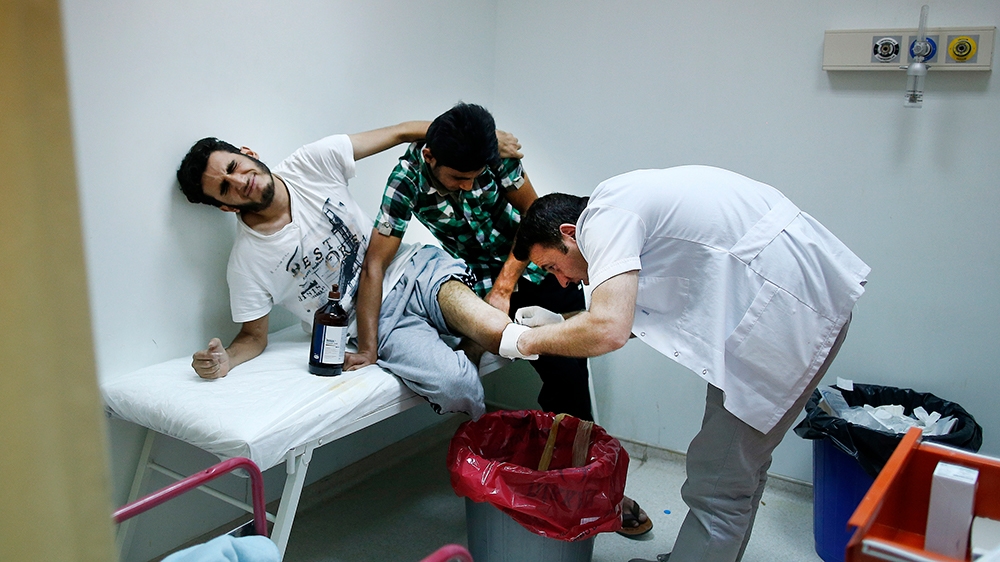UN chief urges world to share refugee burden more equitably
As most refugees live in poor countries, Guterres calls on international community to do more as he opens global summit.

The United Nations chief, Antonio Guterres, has called on countries to take joint responsibility for caring for a surging number of displaced people as he opened a global refugee summit in Geneva.
“It is a moment to build a more equitable response to refugee crises through a sharing of responsibility,” Guterres said in his opening speech to the Global Refugee Forum on Tuesday.
Keep reading
list of 3 itemsThe invisible violence of Europe’s refugee camps
Dozens of people die in Atlantic Ocean off Mauritania
With a full 80 percent of the world’s refugees living in poor and developing countries, which often feel left to shoulder the heavy economic and societal costs alone, burden-sharing is high on the agenda at the meeting.
“The world owes all countries and communities that welcome large numbers of refugees a debt of gratitude,” Guterres said, stressing though that “gratitude is not enough”.
“At this time of turbulence, the international community must do far more to shoulder this responsibility together.”
Several world leaders are at the event, including Turkish President Recep Tayyip Erdogan and Pakistani Prime Minister Imran Khan.
Turkey is the world’s largest host of refugees with more than three million of them on its soil, mainly from Syria.
“We need to find a formula to allow [Syrian] refugees … who travelled to Turkey to be resettled in their motherland,” Erdogan told delegates, as he called for a “peace zone in northern Syria”.
He said 371,000 Syrian refugees had already voluntarily resettled in northern Syria since Turkey’s military operation, adding that number could rise to one million “in a very short period of time”.
The forum, which will last through Wednesday, begins exactly a year after the UN General Assembly adopted a framework aimed at creating a more predictable and equitable approach to providing assistance to refugees and host communities.
The meeting is the first of its kind, pooling together heads of state, government ministers, as well as business leaders, humanitarians and refugees themselves, to offer ideas and pledges for more efficient support.

At the end of 2018, nearly 71 million people were living in forced displacement due to war, violence and persecution, including nearly 26 million people who had fled across borders as refugees.
Pakistani Prime Minister Khan used the forum to discuss events in India, as he warned that millions of Muslims could flee the country due to the curfew in the disputed territory of Kashmir and India’s new citizenship law, creating “a refugee crisis that would dwarf other crises”.
Khan said: “We are worried there not only could be a refugee crisis, we are worried it could lead to a conflict between two nuclear-armed countries.”
According to UNHCR, Pakistan hosts more than 1.4 million registered Afghans who have been forced to flee their homes.
“Our country will not be able to accommodate more refugees,” Khan said, urging the world to “step in now”.
During the forum, hundreds of pledges are expected from countries, organisations and businesses, including financial donations, but also technical and material assistance, legal and policy changes meant to help ensure greater inclusion for refugees.
Sana Mustafa, a Syrian refugee and founding member of the Network for Refugee Voices, is among dozens of refugees attending the forum.
She told Al Jazeera: “Having 70 refugee representatives out of the 2,000 plus attendees is not enough.
“People shaping policies and projects have not necessarily had any refugee experience. These solutions are not efficient. For solutions to be efficient, they have to be well informed. If we are not working altogether, stakeholders including refugees themselves … we will never have sustainable solutions.
“We are demanding actions, not words. We do not want this to be just another meeting.”

Mohammed Badran, a 25-year-old Palestinian refugee who fled Syria’s war for the Netherlands was also at the event. He said: “We need actions and we don’t just need empty words.”
The UN said it was also hoping for more resettlement spots in third countries for vulnerable people already living as refugees, and moves to ensure safe returns to their places of origin.
But the challenges remain overwhelming, Oxfam warned on Monday, charging that today’s system is “fatally flawed and putting the responsibility unfairly upon some of the poorest countries”.
“Millions of vulnerable refugees are at risk or stuck in limbo because many countries are failing to shoulder their fair share of responsibility for protecting people forced from home,” Oxfam chief Danny Sriskandarajah said in a statement.